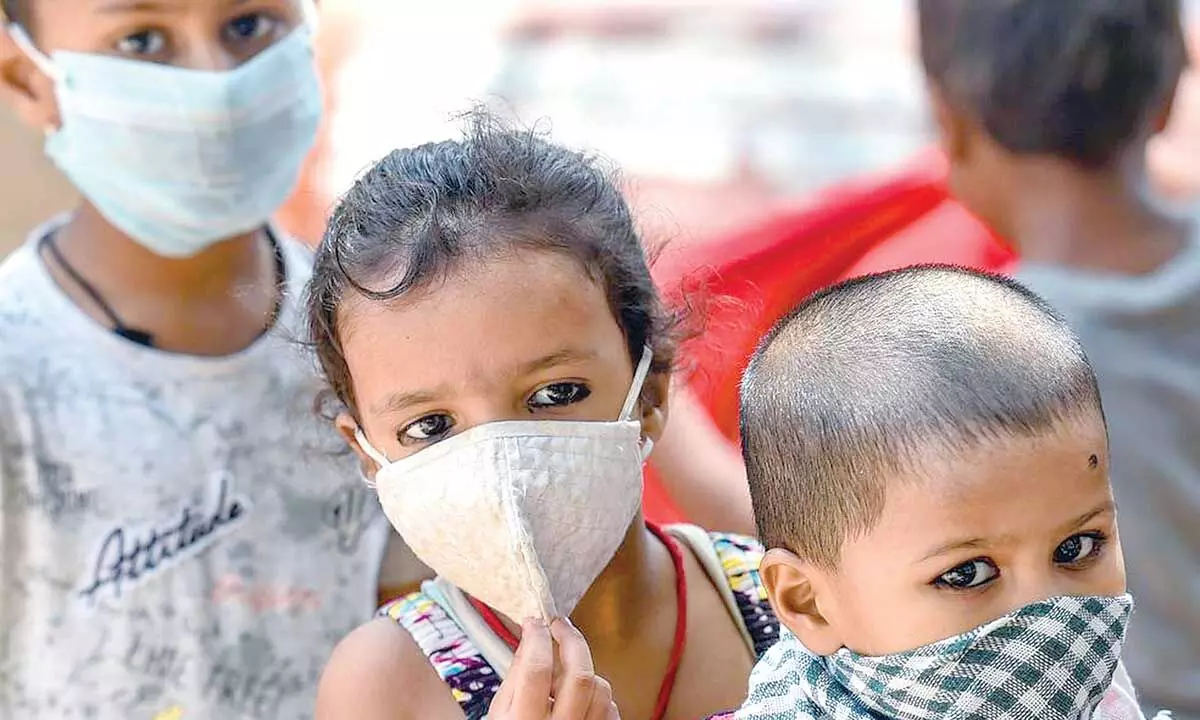Covid-19 lockdown played havoc with children's mental health, says report

Covid-19 lockdown played havoc with children’s mental health, says report
While Covid-19 has been a tough phase for everyone, isolation from the peer groups had a major impact on the mental well-being of children.
Bengaluru: While Covid-19 has been a tough phase for everyone, isolation from the peer groups had a major impact on the mental well-being of children. School closures, decrease in physical activity, inability to access online learning, and so on have resulted in a loss of routine. A report by 'Save the Children' has revealed that the ones who were affected the most during the pandemic were children belonging to the marginalised sections.
Feeling of loneliness (59%) and being worried about death, illness, separation or disease (83%) was found to be maximum in Karnataka, according to the study. Abhik Bhattacherji, Senior Director Regions, Teach for India, says that CHILDLINE (1098) reported a 50% increase in children reaching out to them for protection from abuse and violence during the lockdown.
"Approximately 92,000 calls related to child abuse were received within the first two weeks of the onset of the pandemic itself. Children living in abusive homes have had to bear the brunt of the lockdown, as there is no escape from their perpetrators. Unfortunately, the lockdown and subsequent school closures also meant the lack of safe havens that these schools provided to help children escape from difficult home environments, even for a brief period of time. Furthermore, in a report published by the Boston Consulting Group, it was found that nearly a third of primary and half of secondary school children faced poor mental and socio-economic health since May 2020," he adds.
Since the lockdown also led to a decrease in socialising amongst their peer groups, it also increased the intensity of emotions that both parents and children feel. Dr Jini K Gopinath, Chief Psychology Officer, YourDOST, says that a lot of students haven't gone to school at all, especially the primary school kids. "They were completely at home attending online classes these two years. During online classes, they had complete control over their activities. They could roam around, have food at any time, could switch off their videos if they wanted to. In a nutshell, there were not a lot of efforts given in developing a disciplined lifestyle. They also didn't have to interact with other people a lot, or take consent. As a result, the sense of community feeling became absolutely absent," he explains.
"There are two ways of looking at it. Firstly, getting back to offline classes is similar to a trauma for them, because they have to go and abide by the rules and regulations as per the school norms. They cannot run away from classes. So they don't have much control and thus some of them might feel helpless. Secondly, they now have a chance to interact with their peers. This opens an opportunity to learn some of the skill sets that they had lost during these two years - social skills and interaction skills," he adds.
Socio-economic challenges
Several families faced economic challenges during this period. "Most of our Students' families were struggling with their livelihoods. We ensured that at least 19,000 of our Students' households were supported with rations during this difficult period. We also found that almost 90% of children, especially those with special needs, lost at least one specific language ability and faced significant Social and Emotional Learning losses," says Bhattacherji.
"Only about 15 % of the population from rural areas are connected to the internet and only 1/10 households have computers/smartphones/tablets. Another big challenge is that only 20% of Indians above five years of age have basic digital literacy. Access to devices became a challenge during the lockdown. Even when they were able to attend online classes, there arose other challenges that included maintaining motivation levels, discipline, access to materials, and lack of student engagement, to name a few," he adds.
Psychological impact on children
Immediate gratification of needs during the lockdown has led to behavioural issues in kids. "Social distancing has also given way to social disengagement. So kids and adolescents were forced to be cooped into their rooms without any social interaction. Even parents were busy due to which students would throw tantrums and parents immediately would gratify their needs so that they can continue to work. This type of unhealthy parenting may have created a number of behavioural issues. Added to that, since children are still in the growth phase, hormonal changes can also be a potential marker of various behavioural issues," says Dr. Gopinath.
Social isolation has also paved a way for an increase in passive leisure activities such as online gaming. "Since the mode of education had also shifted online, some of the students had access to gadgets. Also, it's not possible for parents to monitor their children every time. Hence, most of the students got addicted to mobile phones due to which screen time increased drastically. This behaviour led to an addiction pattern, and is also a major reason for aggression among children," he explains.
The pandemic has affected both, physical and mental health. "Being stuck in their homes for long periods, sharing gadgets between siblings, having access to a quiet and safe place to learn has been a challenge. The pandemic has had a both physical and psychological impact on our children. Vitamin D deficiencies, headaches, and issues of eyesight have been the obvious physical impacts. This has been compounded by having to support families, over extend their learning time to contribute to household chores, take care of younger siblings, sharing limited resources and in many cases even migration and the loss of familiar ecosystems of support," says Bhattacherji.
Getting over these problems
Since students are attending offline classes again, stress, emotional, and adjustment issues are quite common. Some changes in their schedule such as indulging in physical and group activities can be of great help. "One of the ways can be ensuring that children have proper avenues to express themselves. Physical exercises, group activities with friends and so on can help them channelize their inner needs.
Another way is to ensure that they have age appropriate venting mechanisms. For example: journaling. They need to have meals on time and also have a proper sleep and wake-up schedule so that they have enough energy to get the best of every day," concludes Dr Gopinath.














